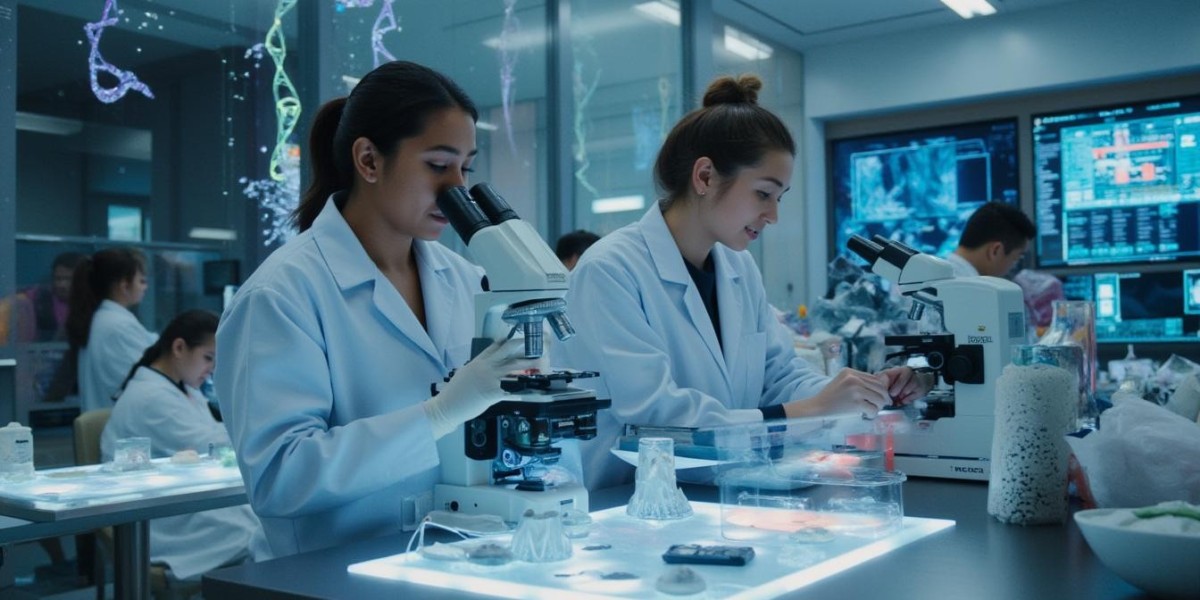Biotechnology has emerged as one of the most transformative fields in modern science, bridging biology and technology to create innovative healthcare solutions. Among the many ways this field has advanced, Biotechnology Engineering Programs have played a pivotal role in shaping skilled professionals, driving research, and fostering innovations that impact patient care, drug development, diagnostics, and more.
At Dr. M.C. Saxena Group of Colleges (MCSGOC), these programs are designed to provide students with a strong foundation in biological sciences, engineering principles, and computational skills. In this blog, we explore how biotechnology engineering is redefining healthcare, the key areas of research, career opportunities, and why enrolling in these programs is a gateway to contributing to the future of medicine.
1. Understanding Biotechnology Engineering
Biotechnology Engineering is an interdisciplinary field combining biology, chemistry, physics, and engineering principles to develop solutions for medical, industrial, and agricultural challenges. It involves applying knowledge of cellular and molecular biology, genetics, microbiology, and biochemistry to design new products, improve healthcare technologies, and optimize biological systems.
Key Focus Areas Include:
Genetic engineering and gene therapy
Pharmaceutical biotechnology
Tissue engineering and regenerative medicine
Diagnostic tools and medical devices
By studying Biotechnology Engineering Programs, students gain hands-on experience in laboratory research, bioinformatics, and computational modeling, enabling them to solve complex healthcare challenges.
2. The Role of Biotechnology in Modern Healthcare
Healthcare today relies heavily on biotechnological innovations to diagnose, treat, and prevent diseases. Biotechnology engineers are at the forefront of creating these solutions. Some of the key contributions include:
a) Drug Development and Personalized Medicine
Biotechnology has revolutionized drug discovery by enabling the development of targeted therapies based on genetic profiles. Personalized medicine ensures that treatments are tailored to individual patients, increasing effectiveness and reducing side effects. Biotechnology engineers work on developing recombinant proteins, monoclonal antibodies, and advanced drug delivery systems.
b) Diagnostic Innovations
Modern diagnostics leverage biotechnology to detect diseases at an early stage. Techniques such as polymerase chain reaction (PCR), CRISPR-based diagnostics, and biosensors allow for rapid and precise identification of pathogens, genetic disorders, and cancer biomarkers.
c) Regenerative Medicine and Tissue Engineering
Advancements in stem cell research and tissue engineering are making it possible to repair or replace damaged tissues and organs. Biotechnology engineers design scaffolds, biomaterials, and bioreactors that facilitate tissue growth, significantly improving patient outcomes.
d) Vaccine Development
Biotechnology plays a critical role in developing vaccines, including mRNA vaccines that have become essential in combating global pandemics. Engineers in this field optimize production processes, enhance delivery systems, and ensure safety and efficacy.
3. Curriculum and Learning in Biotechnology Engineering Programs
Enrolling in Biotechnology Engineering Programs at institutions like MCSGOC offers students a holistic learning experience. The curriculum typically covers:
Molecular biology and genetics
Microbial biotechnology
Bioprocess engineering
Bioinformatics and computational biology
Biostatistics and data analysis
Students also gain exposure to practical training, internships, and research projects. This combination of theoretical knowledge and hands-on experience ensures they are well-prepared to enter the healthcare industry.
4. Research and Innovation Opportunities
One of the most exciting aspects of biotechnology is the scope for research. Students and professionals are continually exploring new avenues such as:
Gene editing technologies (CRISPR-Cas9) to treat genetic disorders
Artificial organs and biomaterials for transplantation
Next-generation sequencing (NGS) for personalized diagnostics
Nanobiotechnology for targeted drug delivery
By participating in research programs, students develop critical thinking skills, scientific rigor, and the ability to translate ideas into practical healthcare solutions.
5. Career Opportunities in Healthcare Biotechnology
Completing a Biotechnology Engineering Program opens doors to diverse career paths, including:
Clinical Research Scientist: Designing and analyzing clinical trials for new therapies
Biopharmaceutical Engineer: Developing drugs, vaccines, and biologics
Bioinformatics Specialist: Using computational tools to interpret biological data
Regenerative Medicine Engineer: Creating tissue scaffolds and organ replacements
Healthcare Consultant: Advising on biotechnological innovations and regulatory compliance
The demand for skilled biotechnology professionals is increasing globally, driven by healthcare advancements and the need for innovative solutions.
6. Impact of Biotechnology Engineering on Global Healthcare
Biotechnology engineering is not only shaping the careers of students but also driving global healthcare transformation. Some of the broader impacts include:
Improved disease prevention and early detection
Enhanced patient-specific treatment approaches
Reduced healthcare costs through efficient drug production
Addressing public health challenges, including pandemics and antibiotic resistance
Promoting sustainability in medical research and manufacturing
By fostering innovation and technological application, biotechnology engineers contribute to making healthcare more accessible, effective, and personalized.
7. Why Choose MCSGOC for Biotechnology Engineering Programs
Dr. M.C. Saxena Group of Colleges (MCSGOC) is a premier institution offering world-class biotechnology engineering education. Key features include:
Experienced faculty with industry and research expertise
State-of-the-art laboratories and research facilities
Collaboration with healthcare organizations and biotech companies
Opportunities for internships, industrial projects, and international exposure
Holistic development programs that combine technical and soft skills
Students who pursue Biotechnology Engineering Programs at MCSGOC are not just learning—they are preparing to lead the next wave of healthcare innovation.
8. Challenges and the Future of Biotechnology in Healthcare
While biotechnology holds immense promise, it also faces challenges such as:
Ethical concerns in genetic engineering and cloning
Regulatory compliance and clinical trial approvals
High costs of advanced technologies and research
Data privacy and security in bioinformatics
However, continuous advancements in AI, machine learning, and nanotechnology are expected to overcome many of these obstacles, paving the way for even greater innovations in healthcare.
9. Conclusion
Biotechnology is fundamentally transforming the healthcare industry, offering new possibilities in disease treatment, diagnostics, and personalized medicine. Biotechnology Engineering Programs equip students with the knowledge, skills, and practical experience needed to drive these advancements.
By enrolling in these programs at Dr. M.C. Saxena Group of Colleges (MCSGOC), students position themselves at the forefront of a field that not only offers rewarding careers but also the opportunity to impact global health positively. The future of healthcare is being shaped by biotechnology, and those trained in this discipline are the innovators leading the way.
Comprehensive FAQ – Biotechnology Engineering Programs
1. What are Biotechnology Engineering Programs?
Biotechnology Engineering Programs are academic courses that combine biology, chemistry, and engineering principles to develop technologies and solutions for healthcare, agriculture, pharmaceuticals, and research.
2. What subjects are studied in Biotechnology Engineering Programs?
Core subjects include molecular biology, genetics, microbiology, biochemistry, bioinformatics, bioprocess engineering, and tissue engineering.
3. Who should pursue a Biotechnology Engineering Program?
Students with a strong interest in biology, technology, research, and healthcare innovation are best suited for this program.
4. What are the eligibility criteria for admission?
Eligibility usually requires completion of 10+2 with Physics, Chemistry, and Biology/Mathematics. Entrance exams may also be required depending on the college.
5. What is the duration of a Biotechnology Engineering Program?
A standard undergraduate program typically lasts 4 years, while postgraduate programs range from 2–3 years.
6. How do Biotechnology Engineering Programs contribute to healthcare?
These programs train students to develop drugs, vaccines, diagnostic tools, regenerative therapies, and personalized treatments.
7. What career opportunities are available after completing the program?
Graduates can work as clinical research scientists, biopharmaceutical engineers, bioinformatics specialists, healthcare consultants, or in regenerative medicine.
8. Can Biotechnology Engineering graduates work in research?
Yes, research is a major career path. Graduates work on genetic engineering, tissue engineering, nanotechnology, and drug development.
9. What skills are gained from Biotechnology Engineering Programs?
Students acquire laboratory techniques, molecular biology skills, bioinformatics knowledge, analytical thinking, and problem-solving abilities.
10. Are internships part of Biotechnology Engineering Programs?
Yes, most programs include internships or industrial training in hospitals, pharmaceutical companies, biotech firms, or research institutes.
11. What is the role of biotechnology in personalized medicine?
Biotechnology enables the development of treatments tailored to a patient’s genetic makeup, enhancing effectiveness and minimizing side effects.
12. How does biotechnology aid in vaccine development?
Biotechnology allows the production of safer and more effective vaccines, including mRNA vaccines, by leveraging genetic engineering and molecular biology techniques.
13. What are emerging areas in biotechnology for healthcare?
Emerging areas include CRISPR gene editing, regenerative medicine, nanobiotechnology, synthetic biology, and AI-driven bioinformatics.
14. How does biotechnology improve diagnostics?
Biotechnological tools like PCR, biosensors, and next-generation sequencing help detect diseases early and with high accuracy.
15. Can biotechnology engineers work internationally?
Yes, biotechnology skills are in global demand, offering opportunities in research labs, pharmaceutical companies, and healthcare organizations worldwide.
16. What is the difference between biotechnology and biomedical engineering?
Biotechnology focuses on biological processes to develop products and solutions, while biomedical engineering combines engineering principles to design medical devices and equipment.
17. What types of research projects can students undertake?
Students may work on gene therapy, tissue regeneration, drug formulation, bioprocess optimization, and bioinformatics analysis.
18. How does biotechnology help combat global health challenges?
It enables rapid vaccine production, antibiotic alternatives, disease diagnostics, and development of therapies for chronic and genetic diseases.
19. What are the ethical concerns in biotechnology?
Ethical concerns include genetic modification, cloning, stem cell research, patient data privacy, and environmental impact of biotech products.
20. Can graduates start their own biotech companies?
Yes, with entrepreneurial skills, graduates can start startups in healthcare diagnostics, drug development, agricultural biotech, or bioinformatics solutions.
21. What is the role of bioinformatics in biotechnology?
Bioinformatics integrates computational tools to analyze biological data, aiding research in genomics, proteomics, and drug discovery.
22. How is tissue engineering revolutionizing healthcare?
Tissue engineering allows the development of artificial organs and regenerative therapies, offering alternatives to organ transplants.
23. What are the challenges in biotechnology education?
Challenges include high research costs, keeping up with technological advancements, ethical considerations, and balancing practical and theoretical learning.
24. How do Biotechnology Engineering Programs at MCSGOC stand out?
MCSGOC offers experienced faculty, advanced laboratories, industrial collaborations, research exposure, and holistic training to prepare students for real-world challenges.
25. Is biotechnology a high-growth field?
Yes, with increasing demand for healthcare solutions, research innovations, and global health challenges, biotechnology is one of the fastest-growing fields worldwide.
26. How does biotechnology contribute to sustainable healthcare?
Biotechnology promotes eco-friendly drug production, reduces reliance on animal testing, and develops biodegradable biomaterials for medical use.
27. Can biotechnology engineers specialize in certain areas?
Yes, graduates can specialize in molecular genetics, pharmaceuticals, clinical research, bioinformatics, regenerative medicine, or industrial biotechnology.
28. How important is practical experience in biotechnology programs?
Practical experience is crucial, as it develops laboratory skills, critical thinking, and the ability to implement theoretical knowledge in real-life healthcare applications.
29. How can students prepare for careers in biotechnology?
Students should focus on academic excellence, research internships, skill development, attending biotech conferences, and staying updated on emerging technologies.
30. What is the future of biotechnology in healthcare?
The future is promising, with advancements in gene therapy, personalized medicine, artificial organs, AI-driven drug discovery, and sustainable healthcare solutions.








